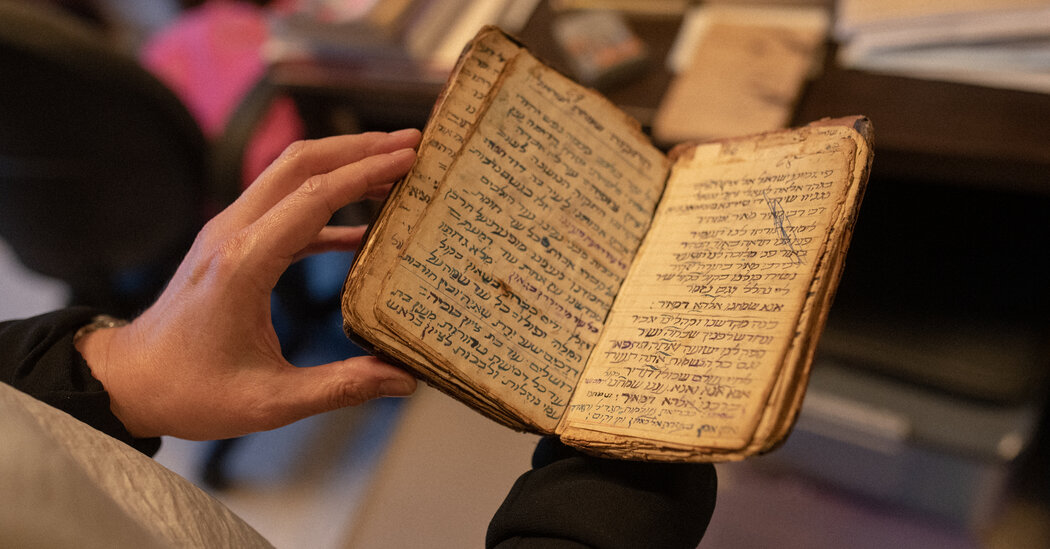
TANGIER, Morocco — They sang to put their babies to sleep, or in the kitchen preparing Purim cakes. They sang in courtyards at night when the men were at synagogue for evening prayer, songs of love, loss, religion and war.
Today, most of those women, members of Morocco’s dwindling Jewish population, are gone. But they have left behind a rich historical trove of northern Judeo-Moroccan Sephardic culture, passed on from one generation to the next through oral history, that scholars of Judaism are striving to preserve before it disappears.
These fragments of history tell powerful stories from times long past, before the Moroccan-Jewish population that once exceeded 250,000 dwindled to the few hundred remaining, after several waves of emigration.
The women were for centuries confined to Jewish quarters, captivated by a world very distant from theirs, singing ballads that eventually became tonal elements of their culture. They latched on to music to preserve their identities and traditions.
The songs, known as “romances,” are a heritage of the Reconquista, or Reconquest, when Christians in medieval Spain waged a centuries-long battle against Muslim occupation. As the Reconquista was nearing its end in 1492, Jews who refused to convert to Christianity were expelled. Many of them ended up in Morocco, bringing their Spanish heritage with them.
The songs reflect this history, with many taunting the Spanish rulers and priests who drove them out. Even though northern Moroccan Jews spoke a hybrid language of Hebrew, Spanish and Arabic, the songs are in Spanish.
But they are not just political statements. They are ballads and lullabies with metaphorical lyrics that do not just speak of history, but are deeply intertwined with personal memories and cultural traditions.
Oro Anahory-Librowicz, a Moroccan-born expert in Judeo-Spanish music, who donated 400 recordings to Israel’s National Library, says that the songs weren’t originally Sephardic but were learned from Spaniards and retained in the culture even as they disappeared in mainland Spain.
“It’s a way of preserving something,” she said over a Zoom interview from Montreal, where she moved in 1973. “Natural transmission isn’t possible in a community that is dispersed all over the world. It has become a sign of identity. Women recognized themselves in this Hispanic heritage and it allowed them to retain a dimension of their Judeo-Hispanic identity.”
One Friday in February, in the hours before sunset and Shabbat, three friends got together as they have on many occasions at the apartment of a pillar in the community, Sonia Cohen Toledano, which overlooks the bay of Tangier in the northern tip of the country, only a few miles across the sea from Spain.
In animated conversation, they interrupted one another frequently, often finishing the others’ sentences. Sifting through a pile of black and white photographs, yellowed with age, they remembered happy times and talked about the shrinking of their community and their urgent need to make the past part of the present and also of the future.
The three women are among the fewer than 30 Moroccan Jews now living in Tangier.
And during many of their gatherings, they end up singing romances.
That day, music rose in the air as they clapped and held hands, smiling while they sang. The sometimes joyous and other times deeply romantic words in Spanish filled the spacious living room, as the women sat on a couch, sipping Moroccan mint tea, in a moment that felt like traveling back centuries.
“We heard them at weddings all the time,” said Julia Bengio, 83. “My mother sang in front of me, but I never thought about telling her, ‘Come here, let me write the lyrics down.’” But she did find cassette recordings of her mother singing and has transcribed the lyrics so they won’t be lost.
“We were never explained what it was, but later in life we looked into it and I want to preserve them,” she added. “Simply not to forget.”
The women sometimes read from handwritten notes, or referred to YouTube videos of the music to jog their memories.
One song mocks a priest who impregnates 120 women. In the song, all the women give birth to girls, except for the cook (from a lower social class), who has a boy. It so happened that she asked the priest explicitly to get her pregnant, and the story connects to some interpretations of the Talmud that says that when women have sexual pleasure, they conceive boys.
Todas paren niñas, la criada varón.
Ciento veinte cunas, todas en derredor,
Menos la cocinera que en el terrazo colgó.
(“They all give birth to girls, And the maid to a boy. One hundred and twenty cradles, all around, except the cook’s child who hung on the terrace.”)
The central message: If their husbands want boys they should give pleasure before taking pleasure.
Mrs. Cohen Toledano, dedicated to keeping connections with the past, is a treasure trove of everything related to northern Morocco’s Spanish Judeo culture.
“Before we had aunts, cousins, family here,” said Mrs. Cohen Toledano, 85, who is the only one of 16 children in her family who stayed in Morocco. “Slowly, everyone left. We are so few that we are close. We see each other all the time. It’s hard, but we get used to it.”
Her home is a mini-museum of Spanish-Judeo culture, a mix and match of embroideries, artwork, photos and a collection of ancient dresses, some over 150 years old — pretty much anything she could get from departing Jews or that she could dig up in flea markets. “Every time someone died, they left me something,” she said.
Vanessa Paloma Elbaz, an American scholar of Judeo-Spanish music at Cambridge University, has spent the last 15 years collecting and archiving the voices of aging Jews in Morocco. To date she has inventoried over 2,000 entries (mostly recordings, and some photos and videos); a pilot of the archive is available online. Dr. Paloma Elbaz has family roots that date back five generations in Morocco.
When she was a child living in Puerto Rico, she learned her first romance while singing in a children’s choir. That stirred her interest in Judeo-Moroccan history, and while she no longer lives in Morocco, she still visits regularly and records as much as she can.
“If we think we have no written text from the women, we are wrong,” she said. “Some archives were sitting in Spain and nobody was paying attention to them.”
“It’s about learning how to read them,” she added. “They sent all kinds of messages. If they were sad about something, they would sing some of these songs to pass a message on to their husbands.”
One day this winter, she met in Casablanca with Moroccan Jews in a kosher deli, and later others backstage of a concert, recording them all. She also sought out the children of Alegría Busbib Bengio, a prominent figure in the city’s Jewish community, who spent the last years of her life handwriting family genealogies and making dresses. She died a few months ago, at the age of 91, leaving her children with the task of preserving everything she so meticulously collected.
“It would mean betraying her to not share her legacy,” her daughter, Valérie Bengio, told Dr. Paloma Elbaz in the apartment where her mother lived from 1967 until her death. “To leave things untouched is to let them die.”
Mrs. Cohen Toledano’s daughter, Yaëlle Azagury, 51, now lives in Stamford, Conn., but her connection with Morocco remains strong. Music is the bridge that connects her to her childhood in Tangier. In an interview, she said she used to sing lullabies to her children that she remembered from her mother, but she doesn’t think her three American-born children will carry on the legacy.
“It’s a lovely heritage,” she said. “The songs need to be heard. These ballads are often deeply moving and part of the world’s heritage. I feel like I am the last chain of a history that ends with me.”




